Reshoring Your Plastic Injection Molded Components: A Strategic Approach
Comments Off on Reshoring Your Plastic Injection Molded Components: A Strategic Approach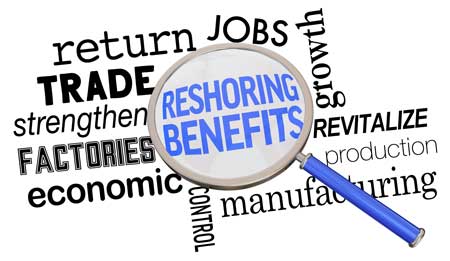 The changing conditions in the global marketplace have manufacturers reconsidering just about everything, particularly their supply chains. Whie this environment can be challenging, the goal remains simple: to continue to maximize profit and efficiency, while minimizing risk. Tariffs in particular have placed urgency on these considerations. But the case for reshoring your plastic injection molded parts goes beyond uncertain economic policies. Today, we’ll lay out a plan for your plastic part sourcing, regardless of tariff outcomes.
The changing conditions in the global marketplace have manufacturers reconsidering just about everything, particularly their supply chains. Whie this environment can be challenging, the goal remains simple: to continue to maximize profit and efficiency, while minimizing risk. Tariffs in particular have placed urgency on these considerations. But the case for reshoring your plastic injection molded parts goes beyond uncertain economic policies. Today, we’ll lay out a plan for your plastic part sourcing, regardless of tariff outcomes.
Making the Best of Both Worlds
Unlike countless click-bait articles that you find online these days, we’ll get right down to our recommendation: employ a hybrid approach. Here, you would have your molds made offshore, but bring the injection molding back stateside. Tariffs aside, there are many benefits to going this route.
Leveraging Offshore Mold Making Expertise
As we discussed in an earlier blog entitled, Should You Source Your Injection Molds from China or the USA?, China has come a long way in recent decades when it comes to the art of mold making. While American mold makers still play an important role, especially when it comes to repairs or extremely demanding requirements, significant cost savings can be realized. Many Chinese companies offer excellent quality and quicker turnaround, as they have refined their processes throughout the years. But as with any supplier – the key though is to make sure you are working with one that is established, reputable and can handle your requirements. Resist the temptation to immediately go with the lowest bidder. While they still might win the job, do your research to make sure they are a good fit.
 Bringing Injection Molding Home
Bringing Injection Molding Home
Transitioning the actual injection molding to US facilities eliminates the significant barriers that come with overseas production and offers many advantages.
- Better Communication and Collaboration – let’s face it, it’s easier to do business with someone that speaks your language. Especially when dealing with injection molding, where we have a language all our own! Small translation issues can lead to big problems down the road.Time zones also create challenges that cause inconveniences such as middle-of-the-night conference calls and delayed responses. Also, working with a US-based supplier allows for facility visits without international travel and the headaches (and costs) associated with it.
- Quality Assurance and Transparency – it’s well known that American manufacturers are typically dedicated to quality management systems and greater transparency. This includes accessible quality documentation and certification, and easier verification of materials and processes with on-site visits.
- Streamlined Logistics and Reduced Lead Times – we probably don’t need to spend much time explaining that domestic production dramatically simplifies your supply chain. Shipping time and costs are significantly reduced. Shorter shipping distances also improve an organization’s carbon footprint.
- Agility and Responsiveness – US-based production provides better agility to manufacturers allowing them to respond quicker to changes in market/customer demands. It also allows for shorter runs, especially in the earlier stages of a product’s lifecycle. Overall, keeping your production closer to home means quicker problem resolution should any issues arise.
- Intellectual Property (IP) Considerations – We’ve all heard the unfortunate stories of companies violating IP protections. Reshoring provides stronger legal protections for your designs and processes. Also, should an infringement arise, it’s easier to fight it here, than there.
Achieving Success with a More Resilient Supply Chain
By having your molds made in China while reshoring injection molding operations, you will have a more resilient and reliable supply chain that combines reliability with cost effectiveness. By taking this hybrid approach, you help insulate your business from potential tariff impacts, while addressing the challenges associated with offshore manufacturing.
At a time when supply chain resilience is increasingly recognized as a competitive advantage, this strategic combination positions your company to navigate global uncertainties while maintaining control over the critical aspects of your production process.

 Bringing Injection Molding Home
Bringing Injection Molding Home 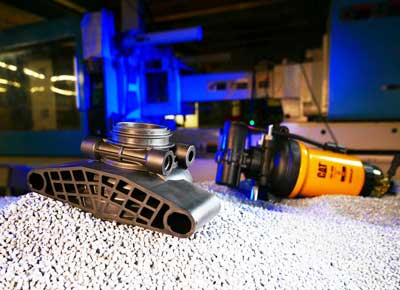 Today, manufacturers are constantly looking for effective ways to reduce costs while improving product performance and production efficiency. One way to achieve this is by shifting from traditional metal parts to thermoplastic ones.
Today, manufacturers are constantly looking for effective ways to reduce costs while improving product performance and production efficiency. One way to achieve this is by shifting from traditional metal parts to thermoplastic ones. Along with the advantages listed above, there are some potential drawbacks that must be considered. Selecting the material that meets the performance requirements of the application is crucial – since thermoplastics vary in their properties and performance characteristics.
Along with the advantages listed above, there are some potential drawbacks that must be considered. Selecting the material that meets the performance requirements of the application is crucial – since thermoplastics vary in their properties and performance characteristics.
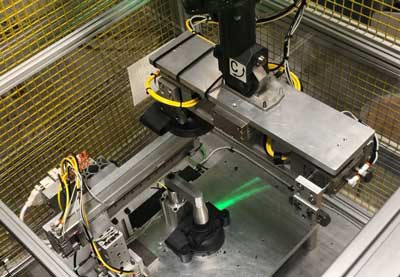 Post-Processing and Assembly – some parts may require post-processing or assembly steps. These include finishing, such as painting, coating, or surface-treating to achieve the desired appearance or performance.
Post-Processing and Assembly – some parts may require post-processing or assembly steps. These include finishing, such as painting, coating, or surface-treating to achieve the desired appearance or performance.








 Molded thermoplastics may be worked using a few different methods: injection molding, blow molding, and extrusion. Injection molding involves heating plastic pellets to a molten state, injecting it into a mold cavity under high pressure, then allowing it to cool and solidify.
Molded thermoplastics may be worked using a few different methods: injection molding, blow molding, and extrusion. Injection molding involves heating plastic pellets to a molten state, injecting it into a mold cavity under high pressure, then allowing it to cool and solidify. Thermosetting plastics, simply known as thermosets, are polymers that undergo a chemical change when heated, thus forming a rigid structure. Once set, they cannot be remelted or reshaped. When compared to thermoplastics, they are usually more stable, but also more brittle. Typical materials include Epoxy, Phenolic, Melamine, Urea-formaldehyde, and Polyester resins.
Thermosetting plastics, simply known as thermosets, are polymers that undergo a chemical change when heated, thus forming a rigid structure. Once set, they cannot be remelted or reshaped. When compared to thermoplastics, they are usually more stable, but also more brittle. Typical materials include Epoxy, Phenolic, Melamine, Urea-formaldehyde, and Polyester resins.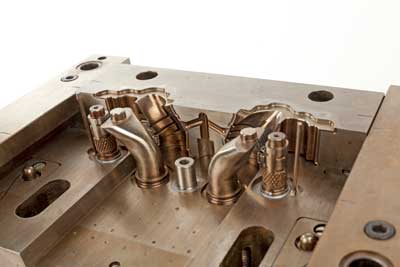 This process involves shaping rubber materials, which can be either natural or synthetic rubber (elastomers). Rubber has high elasticity and abrasion resistance with good tensile strength. These properties vary based on the type used, which include Natural Rubber, Neoprene, and Nitrile Rubber.
This process involves shaping rubber materials, which can be either natural or synthetic rubber (elastomers). Rubber has high elasticity and abrasion resistance with good tensile strength. These properties vary based on the type used, which include Natural Rubber, Neoprene, and Nitrile Rubber.
 will utilize inline part inspection to help ensure part quality. With this critical step, an image of the finished part is taken, compared to a reference image, and is either accepted, or, sadly, pushed into the reject bin. (But don’t be too sad, that part will get a second chance here at PDI, since we recycle all excess plastic inline!)
will utilize inline part inspection to help ensure part quality. With this critical step, an image of the finished part is taken, compared to a reference image, and is either accepted, or, sadly, pushed into the reject bin. (But don’t be too sad, that part will get a second chance here at PDI, since we recycle all excess plastic inline!)



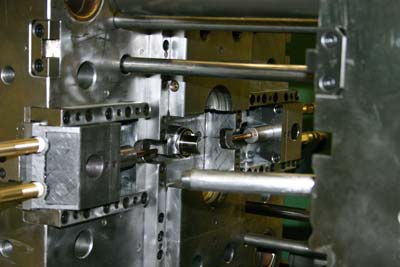 There are three aspects of plastic part design that are often overlooked, but crucial for manufacturing success: surface finish, texture, and draft angles. Understanding and optimizing each is critical for fabricating consistent, high quality plastic components efficiently.
There are three aspects of plastic part design that are often overlooked, but crucial for manufacturing success: surface finish, texture, and draft angles. Understanding and optimizing each is critical for fabricating consistent, high quality plastic components efficiently. Texture – helps enhance the look, functionality, and performance of the finished component. Common options include leather-like, pebble/sandblasted, geometric patterns, and micro textures. Leather-like finishes enhance aesthetics, functionality, and performance. Pebble or sandblasted textures are durable and hide scratches. Geometric patterns provide functional grip, but may also be used for decorative purposes. Finally, micro-textures are ideal for parts where glare reduction or wear resistance is desired. Note that fine textures might require more intricate mold designs. One last thought on texture: textured molds can be more expensive to manufacture.
Texture – helps enhance the look, functionality, and performance of the finished component. Common options include leather-like, pebble/sandblasted, geometric patterns, and micro textures. Leather-like finishes enhance aesthetics, functionality, and performance. Pebble or sandblasted textures are durable and hide scratches. Geometric patterns provide functional grip, but may also be used for decorative purposes. Finally, micro-textures are ideal for parts where glare reduction or wear resistance is desired. Note that fine textures might require more intricate mold designs. One last thought on texture: textured molds can be more expensive to manufacture.